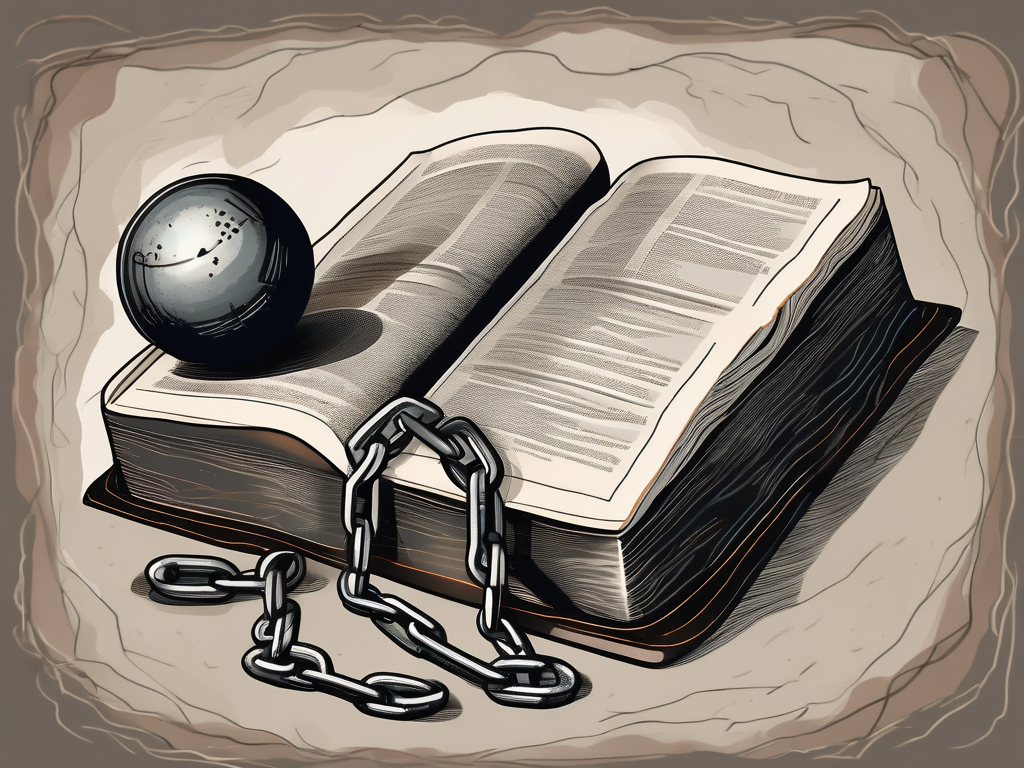Many parents turn to the Bible for guidance on various aspects of parenting, including discipline. Spanking, as a disciplinary method, remains a controversial topic. While some interpret certain passages in the Bible as advocating for spanking, others argue for non-physical forms of discipline. In this article, we will explore what the Bible has to say about spanking, examining both scriptural texts and various theological perspectives.
Understanding the Concept of Discipline in the Bible
Before delving into specific biblical verses, it is important to understand the broader concept of discipline as presented in the Bible. Discipline, in the biblical context, is seen as a means of correction and instruction rather than punishment. It aims to shape character and guide individuals towards righteousness. The concept of discipline is deeply rooted in the belief that God, as a loving Father, disciplines His children to help them grow and mature.
Discipline in the Bible is multifaceted, encompassing various aspects such as teaching, training, guidance, and correction. It involves not only the physical discipline of the body but also the spiritual discipline of the heart and mind. The ultimate goal of discipline is to cultivate a life of righteousness and holiness, aligning one’s thoughts, words, and actions with God’s will.
With this understanding of discipline, we can proceed to examine how discipline, and specifically spanking, is addressed in both the Old and New Testaments.
The Old Testament and Discipline
In the Old Testament, the book of Proverbs is often cited as a source of wisdom on parenting and discipline. Proverbs 13:24 states, “Whoever spares the rod hates their children, but the one who loves their children is careful to discipline them.” This verse is commonly interpreted by some as an endorsement of spanking as a form of correction.
However, it is important to note that this verse should not be taken in isolation. The book of Proverbs encompasses a vast array of teachings on child-rearing, emphasizing the importance of love, guidance, and communication. Scholars argue that the use of the term “rod” in this verse should not be understood solely as a physical implement, but rather as a symbol of authority and discipline.
Furthermore, other verses in the Old Testament shed light on the compassionate nature of God’s discipline. Psalm 94:12 states, “Blessed is the one you discipline, Lord, the one you teach from your law.” This verse highlights the connection between discipline and instruction, emphasizing that discipline is not meant to harm or inflict pain but rather to teach and guide.
It is also worth noting that the Old Testament contains numerous stories that illustrate the consequences of disobedience and the importance of discipline. The story of King David and his son Absalom serves as a poignant example of the destructive consequences that can arise from a lack of discipline and parental guidance.
The New Testament and Discipline
In the New Testament, discipline is approached from a different perspective. The Apostle Paul encourages parents in the book of Ephesians (6:4) to “bring [their] children up in the training and instruction of the Lord.” This verse highlights the importance of teaching and spiritual guidance in the process of discipline.
Additionally, the book of Hebrews offers insights into the nature of discipline as an expression of God’s love. Hebrews 12:11 states, “No discipline seems pleasant at the time, but painful. Later on, however, it produces a harvest of righteousness and peace for those who have been trained by it.” This verse underscores the transformative power of discipline and its ultimate goal of shaping individuals to walk in righteousness.
Jesus Himself provides a model of discipline through His teachings and interactions with His disciples. He corrects, instructs, and guides them with love, patience, and wisdom. His discipline is aimed at transforming their hearts and minds, enabling them to become faithful followers and ambassadors of His kingdom.
It is important to note that the New Testament also emphasizes the role of grace and forgiveness in the process of discipline. While discipline is necessary for growth and maturity, it is always accompanied by God’s abundant grace and the opportunity for repentance and restoration.
In conclusion, the concept of discipline in the Bible goes beyond mere punishment. It is a holistic approach to correction and instruction, encompassing physical, spiritual, and emotional aspects. Discipline is rooted in love and aims to shape individuals to walk in righteousness, aligning their lives with God’s will. As we seek to understand discipline in the Bible, it is crucial to approach the topic with a balanced perspective, considering the broader teachings and principles that underpin this important aspect of Christian life.
Biblical Verses Related to Spanking
While the aforementioned verses are often associated with spanking, it is essential to consider their broader contexts and the theological perspectives surrounding them. Let us examine these verses in more detail:
Proverbs and Its Interpretations
Proverbs, as a book of wisdom literature, offers guidance on various aspects of life, including parenting. In the context of discipline, it emphasizes the importance of providing correction, guidance, and instruction to children.
When we delve into the teachings of Proverbs, we find that it encourages parents to be actively involved in their children’s lives. It emphasizes the need for parents to be present, to listen, and to guide their children on the right path. The “rod” mentioned in Proverbs 13:24 has been interpreted in different ways by scholars and theologians throughout history.
Some argue that the “rod” symbolizes physical discipline, while others believe it represents authority and guidance. Those who interpret it as physical discipline often emphasize the importance of setting boundaries and consequences for children’s actions. They believe that spanking, when done in a loving and controlled manner, can help children understand the seriousness of their behavior and learn from their mistakes.
On the other hand, those who view the “rod” as a symbol of authority and guidance argue that it is more about teaching and training children rather than physical punishment. They believe that parents should focus on consistent instruction, nurturing, and setting a positive example for their children.
Understanding Proverbs requires a holistic approach, considering its teachings as a whole. Proverbs 22:6, for example, advises parents to “train up a child in the way he should go.” This verse highlights the significance of consistent instruction and nurturing in a child’s development, rather than solely focusing on physical discipline.
Disciplinary Teachings in Hebrews
The book of Hebrews portrays discipline as an expression of divine love. By comparing discipline to a loving parent’s correction of a child, the author emphasizes its redemptive nature. Spanking, in this context, is seen not as an endorsement, but as an allegory demonstrating the purpose and ultimate goal of discipline.
Hebrews 12:6-7 states, “For the Lord disciplines the one he loves, and chastises every son whom he receives. It is for discipline that you have to endure. God is treating you as sons. For what son is there whom his father does not discipline?” This passage highlights the idea that discipline is an act of love, intended to shape and mold individuals into better versions of themselves.
The passage in Hebrews calls on believers to endure discipline as an opportunity for growth and spiritual development. By focusing on the transformative effects of discipline, the emphasis is placed less on physical means and more on the thorough training of individuals in righteous living.
It is important to note that the Bible does not provide a clear-cut directive on the specific methods of discipline, including spanking. The interpretation and application of these verses may vary among different individuals and religious communities.
Ultimately, the key message conveyed by these biblical verses is the importance of discipline in raising children. Whether one interprets it as physical discipline or as guidance and instruction, the underlying principle remains the same – parents have a responsibility to teach, correct, and guide their children with love and wisdom.
Theological Perspectives on Spanking
As with many topics, there are a range of theological perspectives on spanking within Christianity. Let’s explore two contrasting viewpoints:
Conservative Views on Spanking
Some conservative Christians argue that spanking, when done in a loving and controlled manner, aligns with biblical teachings on discipline. They believe that physical correction can effectively reinforce boundaries and teach children the consequences of their actions.
These conservative perspectives draw upon biblical passages such as Proverbs 13:24 which states, “Whoever spares the rod hates his son, but he who loves him is diligent to discipline him.” They interpret this verse as supporting the use of physical discipline as a means of showing love and care for a child’s moral development.
However, it is important to note that within these perspectives, there is a recognition of limitations and risks associated with spanking. Responsible application, love, and communication are acknowledged as essential components of any disciplinary approach. Conservative Christians emphasize the importance of using spanking as a last resort, after other methods of discipline have been exhausted.
Furthermore, they emphasize the need for parents to exercise self-control and avoid anger when administering physical discipline. They believe that spanking should never be done in a way that causes harm or humiliation to the child.
Liberal Views on Spanking
On the other hand, many liberal Christians advocate for non-physical forms of discipline, emphasizing the importance of communication, understanding, and positive reinforcement. These perspectives interpret the biblical teachings on discipline as emphasizing guidance, nurturing, and instruction rather than physical punishment.
Liberal Christians argue that effective discipline can be achieved through open dialogue, setting clear expectations, and promoting emotional and intellectual development in children. They believe that children should be treated with respect and dignity, and that physical discipline can potentially harm a child’s self-esteem and emotional well-being.
These perspectives often reference biblical passages such as Ephesians 6:4 which states, “Fathers, do not provoke your children to anger, but bring them up in the discipline and instruction of the Lord.” Liberal Christians interpret this verse as emphasizing the importance of nurturing and guiding children in a loving and compassionate manner.
Instead of spanking, liberal Christians encourage parents to use alternative disciplinary techniques such as time-outs, loss of privileges, or natural consequences. They believe that these methods can effectively teach children about responsibility and accountability without resorting to physical punishment.
It is worth noting that within both conservative and liberal perspectives, the ultimate goal of discipline is to help children grow into responsible and compassionate individuals. While the methods may differ, the underlying intention remains the same.
Spanking in the Context of Christian Parenting
When considering spanking within the context of Christian parenting, it is crucial to balance discipline with love and care. Both conservative and liberal Christians stress the importance of nurturing a child’s emotional well-being and providing them with a safe and loving environment.
While some may choose to incorporate spanking as part of their disciplinary approach, it is crucial to recognize that there are alternative methods available. Non-physical forms of discipline, such as time-outs, withdrawal of privileges, and logical consequences, are often promoted as effective alternatives within Christian parenting.
Balancing Discipline and Love
Christian parenting should strive to strike a balance between discipline and love. Discipline should be guided by the principles of correction, instruction, and spiritual growth, rather than solely focusing on punishment.
Parents are encouraged to communicate openly with their children, providing guidance and explaining the rationale behind disciplinary actions. By nurturing a relationship built on trust and respect, parents can effectively navigate the challenges of discipline while promoting a loving and supportive environment.
Non-Physical Forms of Discipline in Christianity
Christianity emphasizes the power of love, forgiveness, and reconciliation. In the context of discipline, this can be manifested through non-physical forms of correction and guidance.
Christian parents can employ various methods, such as setting clear boundaries, having age-appropriate expectations, communicating consequences, and offering alternatives for negative behaviors. By focusing on character development and personal growth, non-physical forms of discipline can foster a healthy and loving environment within Christian households.
The Bible, Spanking, and Modern Society
As society evolves and our understanding of various topics expands, it is important to consider the implications of spanking in the modern context. Let’s explore two key perspectives:
Legal Implications of Spanking
In many countries, laws regarding spanking have changed over time. What was once seen as an acceptable disciplinary method, in some instances, is now considered abusive. It is important for parents to familiarize themselves with the legal framework within their jurisdiction to ensure their disciplinary practices align with regulations and societal expectations.
Psychological Implications of Spanking
Researchers and psychologists have extensively studied the psychological effects of spanking on children. While some argue that occasional and controlled spanking may have limited negative consequences, others emphasize potential long-term risks associated with physical discipline, such as increased aggression, anxiety, and negative mental health outcomes.
It is crucial for parents to consider these findings and explore alternative disciplinary methods that promote emotional well-being, self-esteem, and healthy child development.
In conclusion, the Bible offers various insights on the concept of discipline, including spanking. While passages in Proverbs and Hebrews may be interpreted as endorsing physical discipline, it is essential to place them within the broader context of biblical teachings on guidance, instruction, and love. Christian parents must strive to strike a balance between discipline and love, recognizing the significance of nurturing emotional well-being and providing a safe and supportive environment. With ongoing discussions and evolving societal norms, it is valuable for parents to consider the legal and psychological implications of spanking, while exploring alternative forms of discipline that align with their faith and promote holistic child development.












